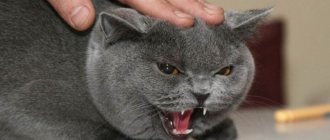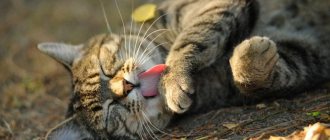Reasons why a cat bites
Inappropriate behavior of cats is most often caused by problems with the health of the animal, disorders of psycho-emotional development and mistakes the owner made during upbringing.
You should start analyzing the reasons why your cat bites with a visit to a veterinarian. The doctor will assess the pet's health - perhaps the cat or kitten is biting due to a lack of vitamins or because its teeth are changing.
In such cases, you need to adjust your diet plan and purchase special teething toys.
- A cat bites when petted in the area of the belly or base of the tail. These are especially sensitive areas on the animal’s body, which the cat tries to protect in this way. This is an instinct of self-preservation that the owner will have to reckon with. If you are petting other parts of your cat's body and she suddenly attacks you, she may be in pain. Show her to the vet.
- Cats bite for love. Do not forget that in the wild, representatives of the cat family bite each other during courtship - this is how they express sympathy for each other. Such a “kiss” is easy to distinguish from aggression: licked, bitten lightly, licked again.
- A cat bites hands if its owners played with their hands in childhood. The animal does not see the difference between toys and human hands, so it can attack, bite and scratch them in play. This reason is 100% human omission. Never play with kittens with your hands and do not allow children to do so.
- Cats bite out of boredom. It also happens. If the cat has nothing to do, she comes up with games for herself: she attacks from around the corner, jumps on her hands, bites her arms and legs. The owner must ensure that the pet has toys or a companion to play with.
- Oddly enough, bites can occur not only from a lack of attention and games, but also from their excess. If you play with an animal for a long time or pet it and see that the tip of the tail is twitching and a slight shiver runs through the fur, leave the cat alone. She's tired of your attention. Otherwise, you risk feeling what a cat bite is. In this way the cat wants to say - don’t touch me!
- Negative experiences are another reason why cats show their teeth. Sometimes owners use caresses to lure their pets into procedures that frighten the animal: injections, bathing, haircuts, nail trimming. If you deceive a cat in this way several times, trust will be lost forever. Don’t be surprised if the animal perceives all subsequent caresses as preparation for unpleasant manipulations and attacks you.
- Early weaning from the mother affects the kitten's behavior. A domestic cat-mother teaches her offspring that there is no need to be afraid of a person - he is a source of warmth and food. If kittens were born in the wild or were separated from their mother early, they do not have this information. For such kittens, a person is a huge, scary, hostile creature that causes aggression. It will be difficult to wean a kitten from biting and scratching - this is how they protect themselves from imaginary danger.
- Pregnant and lactating cats can change their personality dramatically. Therefore, during these important periods of a cat’s life, it is better not to touch them. They bite and scratch to protect their young.
- By using physical pressure on humans, animals try to express their dissatisfaction. For example, if a cat does not like the owner’s behavior (for example, he is nervous or screams a lot), then she tries to attract his attention. First, the animal meows invitingly - expresses a specific demand. Then, if this does not help, the cat may start biting and scratching. An attentive owner will be able to understand what the pet wants to convey to him.
Why does a kitten scratch and bite?
The question of what to do if a kitten bites and scratches is asked by both experienced cat owners and those who decided to have a pet for the first time. Before reacting to a kitten’s cocky habits, it’s worth analyzing its behavior, the habits of family members, and possibly frequent guests. It happens that a cat bites hard because it doesn’t feel well, and its depressed state often finds expression in aggression towards others. An aggressive reaction may be revenge for shouting and swearing. Cats love silence and a calm atmosphere at home. Scratching does not mean that someone in the family is scolding the pet.
The kitten bites and gets angry even because someone is making noise in the apartment or people are quarreling. Therefore, if the family speaks in a raised voice, most likely, it will be the loudest member of the family who will be the object of the kitten’s aggression.
Subscribe to our newsletter and get a free veterinary consultation
Thanks for subscribing!
Cats are patient, but can flare up and start gnawing, biting and scratching if they are not noticed. Therefore, when a kitten follows the owner with its tail, meows, looks into the eyes, asks to be held or offers to play, and then suddenly starts scratching, biting or gnawing on hands, the owner must show attention and at the same time make it clear to the pet that this is how to behave. it is forbidden.
A game
Hunting is a common occurrence in the wild for felines. For example, you can consider the way tigers hunt in the wild. They stalk, catch up, and suddenly attack a prey that can significantly exceed them in size and strength. Tightly grasping the victim with its front paws, they grab the scruff of the neck with their teeth, and with their hind paws they deliver sharp and strong blows, knocking them down. Unlike their counterparts, domestic cats do not need to get food on their own. The owner takes care of the pet, gives food, changes the tray, and provides the cat with everything necessary. But this is exactly how the basic natural instincts of cats are suppressed, and this inevitably affects the pet’s behavior. A domestic cat bites while being carried away by play, simulating hunting.
For example, it can track down a toy, rush at it, then carry the “prey” in its teeth for a long time, bite, roll with it and let go again. Hunting habits cannot be exterminated. The owner should not stop the cat from playing with objects. But the hunting instinct must be within certain limits and not affect family members. Jumping on people's backs from cabinets or playing with legs or arms is unacceptable.
The natural need of a getter prompts a cat, hiding in a secluded place, to carefully observe the actions of a potential victim, and then suddenly rush at it, biting or scratching. Overexcitement while playing with people is the most common reason why a kitten will bite and scratch. The kitten's playing with its legs or jumping on its shoulders amuses and causes affection at first. But later, when the pet grows up, the blows and bites will be very noticeable and can result in serious injuries. If this behavior is not stopped in time, it will become a rule and it will be extremely difficult to wean your pet. Moreover, even careful attempts to calm will cause resentment and an active attack in response.
If the prey twitches and tries to escape, the cat rushes at it, becoming more reckless. If a cat bites and the owner abruptly removes his legs or arms, the pet’s instinct kicks in and he begins to rush at the owner with renewed vigor. This nuance of behavior must be taken into account when stopping the game. The owner must accept this prank without fear or anger, do not run away, do not move his legs, do not pull out his arms. The calm behavior of the victim will surprise the pet, since it neutralizes the hunting instinct.
However, such behavior cannot be left unpunished.
Well-being
One of the most common causes of animal aggression is the owner’s touching the cat’s “forbidden places.” For example, in the area of the tail or belly, although it is easier to say where the cat allows itself to be stroked. The tail or belly are constantly vulnerable places, and the understanding of danger has been fixed for many centuries at the level of instincts. Sudden aggression in response to touching them is a normal reflex reaction of a pet. Over time, the cat may begin to trust and begin to expose its stomach. But even in those moments, you should expect light blows with “soft” paws.
Veterinarians name several main reasons that cause irritation in pets:
- a cat disease that causes it to be aggressive. The owner should pay attention to the presence of symptoms such as loss of appetite, pain when touched, difficulty urinating or the appearance of discharge;
- The change of teeth in kittens lasts a short period. At this time, the kitten becomes especially biting. It is worth buying toys or treats that can be chewed for a long time;
- A cat's fatigue manifests itself in the fact that it is capricious and does not want to be touched. By biting, the cat makes it clear that it is not time to pet or pick up;
- Hormonal changes always affect a cat's mood, increasing irritability. The most common factors are pregnancy or breastfeeding. Sometimes sudden aggression indicates that the cat is pregnant.
If the reason for biting behavior lies in the well-being of the pet, then scolding it is pointless. You need to take the animal to a veterinarian, who will examine and identify the real cause of the irritability.
Behavioral reasons
Cats are mysterious and capricious creatures, sometimes so contradictory that it is not easy to understand their motivation. There are no universal recipes for how to stop kittens from biting and scratching from childhood. These are such individual manifestations that we can talk about general recommendations: what is welcome and what should not be allowed.
At first glance, an aggressive Briton may in fact simply lack a sense of security. Sensing danger, the pet hisses, arches its back and tail and, as a rule, runs away and hides. But if he has nowhere to run or is inflamed by his own fear, then he can expect an attack. The causes of fear can be very different: for example, a sharp sound, smell, movement. Sudden aggression can be triggered by the behavior of another pet or a stranger. Aggression in cats is part of adaptation. Thus, most cats are extremely sensitive to any move and unfamiliar surroundings. Even rearranging the furniture in the apartment can greatly irritate your pet. The cat just needs to be left alone and given time to get acquainted with the new environment; soon the understanding will come that the changes are not dangerous and do not pose a threat.
Competition is also a common cause of aggression in cats. The cause of the nervous state may be local cats that walk along the eaves or walk under the windows. Unable to drive away strangers, the cat begins to bite and can even attack nearby family members. The solution is to block the pet’s access to the windowsill. But if the reason is another pet living at home, then the task becomes more complicated. The territory becomes a battlefield, and it goes to both people and cats.
The cat scratches due to lack of personal space. If your pet doesn't have his own corner where he feels safe, he may become stressed and lash out. But a cat can also defend its territory: a part of the apartment that it considers its own can be protected from family members. If someone tries to force a cat out of a favorite place, the response will be aggression: in defense, the cat scratches.
Protection is more often caused by mistakes in upbringing, when the kitten was allowed to feel like the center of the house, and unacceptable behavior was encouraged by family members. Educational mistakes are a common factor that makes it difficult to wean a kitten from scratching and biting. The mother cat stops the ugly behavior of the kittens. When a kitten is taken away from its mother too early, the owner takes over the upbringing. In fact, the opposite happens: the family spoils the child, allowing him to dominate and bully. As a result, the kitten bites and attacks all the time. It becomes more and more difficult to wean off attacking, biting and scratching. The matter may go so far that the help of an animal psychologist is required.
Aggressive behavior in some breeds, for example, in the British, is inherited. There is an expression “a cat has a Scottish character.” Sometimes it’s scary to pet such a handsome guy! Breeders cull individuals with increased aggressiveness. If a kitten is picked up on the street, its behavior is unpredictable. The kitten may bite, hiss, be afraid, or hide. Or he may turn out to be affectionate and grateful for comfort and food.
The most difficult group of reasons to resolve is aggressive behavior associated with the psychological characteristics of a particular cat. This is expressed in the manifestation of strong dominance, revenge, and constant night activity. The reasons may be the specifics of the breed, and the psychological trauma of the pet due to poor breeding.
How to stop a cat from biting
When the cause of the bites has been identified, it is necessary to begin correcting the animal’s behavior. The approach should be comprehensive and include the following activities:
- Remove factors that irritate the animal and create comfortable conditions for it.
- Do not allow household members and strangers to tease the cat. Suppress all attempts to play with hands and feet. Avoid sudden movements and running in the presence of a cat, so that its “hunter” instinct does not turn on - only the prey breaks free and runs away from the hunter.
- Develop a system for weaning off biting, including conditional punishments.
Speaking about punishment, we do not call for beating the cat. Hitting, really scaring, hurting is prohibited! Use a loud sound, a stern voice, or water as punishment.
Cats have sensitive hearing, so any sharp sound or shout causes discomfort. Water, which cats do not like, has a similar effect.
So, here are our tips to help stop your cat from biting:
- No more than a few seconds should pass between the punishment and the offense. A clear connection should be formed in the pet’s head between the bite and spraying with water from a spray bottle or a loud cry. As soon as the cat has started teething, you need to spray it or loudly say the conditional word: “no” or “teeth.” The word should always be the same, so the animal will quickly remember what it is being scolded for.
- You need to be relentless. You need to punish for every bite. This is the only way the cat will develop an association: a bite is a punishment. If one bite is punished and the other goes unnoticed, the cat will experience stress from not understanding the situation.
- No provocations! If you are playing with a cat and see that he is tired of it, stop playing before the cat shows defensive aggression. You cannot punish an attack if you caused it yourself. This can cause a cat’s phobia - the animal will be afraid to defend itself, and this goes against its nature.
- As soon as you feel the cat's teeth on your hand, lightly click it on the nose - it does not hurt, but it is very unpleasant for the animal. You can respond by sticking your finger deeper into your pet’s mouth. No cat will like this action; he will begin to associate his bites with an unpleasant feeling of nausea - this should force the animal to keep its teeth to itself.
If you are consistent, strict, patient and loving, you will find a way to stop your kitten from biting.
Possible complications
Improper wound treatment and infection with pathogenic microorganisms can provoke the development of a number of complications:
- addition of a purulent-inflammatory process;
- blood poisoning;
- damage to the lymphatic system with enlarged lymph nodes and increased load on the spleen;
- prolonged non-healing and weeping of the wound, at the site of which a characteristic ulcer forms;
- the appearance of scars and cicatrices.
You should immediately consult a doctor if the following additional symptoms appear:
- increase in body temperature, fever;
- redness of the wound and changes in its external parameters;
- the appearance of purulent discharge and an unpleasant odor;
- signs of general intoxication in the form of nausea, weakness, upset stool;
- enlarged lymph nodes in the armpit and elbow.
This can manifest itself as a serious disease, felinosis, which requires complex treatment and close monitoring by a doctor. Self-medication can be ineffective and life-threatening.
Scratches should not be left unattended, especially in the summer, when the risk of infection is greatest. In the case of long and deep scratches, they must be sealed with a bactericidal plaster or a sterile bandage must be applied, under which there is a wound healing agent. Dressings should be changed frequently to avoid worsening the inflammatory process.
What to do if your cat scratches
To stop a cat from scratching, you can use the tips we gave above or try these:
- To stop the kitten from rushing and scratching, you can use its natural fear - throw a towel or light pillow over it. The sudden onset of darkness will sober up the child who is playing up, and an association will form in his head: if I scratch, it’s dark. Be patient, raising a kitten is a long process.
- If a kitten or adult animal scratches while playing, distract its attention. Take your hands off. Invite him to play with a toy or teaser. Be adamant and stop all attempts by children and guests to play with the animal with their hands.
- Try to stop your kitten from scratching using noise. Every time the animal releases its claws, stop the raging “aggressor” with a loud sound. You can clap your hands sharply, hit the pan with a spoon, or drop something on the floor. The cat is sobered by sharp loud sounds. If you repeat “sound punishment” constantly, the cat will learn a lesson, and it will be possible to prevent an attack on a person with this sound.
- If you use the words “no” or “teeth” to discourage biting, do not use them when your cat scratches you. Choose another conditional punishment word. For example, “claws” or “paws”. You need to say the punishment word in a loud, calm voice every time the animal tries to use its claws on you, your household or guests.
If none of the above helped you, remember how a mother cat teaches kittens. Gently grab the “furry aggressor” by the scruff of the neck – in this position he will immediately calm down and become quiet!
Treatment and treatment
The first thing to do when a cat scratches you is to disinfect the wound. For these purposes, hydrogen peroxide or chlorhexidine is used. A small amount of disinfectant is applied to the wound, after which the remaining liquid in it is removed using blotting movements.
If bleeding occurs, take a piece of bandage or gauze, soak it generously in antiseptic, then apply it to the wound surface and press. After a few minutes the bleeding stops.
To heal the wound as quickly as possible, special ointments and creams . The most effective of them are:
- Levomekol - disinfects and promotes rapid regeneration of damaged areas of the epithelium. Can be applied openly or under a bandage at night.
- Bepanten - has a thick, oily consistency that does not allow the ointment to spread under the influence of body temperature. Contains provitamins that promote rapid wound healing.
- Actovegin - contains microelements that help saturate the cells of the wound surface with nutrients, which helps accelerate metabolic processes, as well as active wound healing.
Actovegin is used to heal cat scratches.
Treatment of the wound, even if it is minor, is performed at least 2 times a day. Before each application of the ointment, it is necessary to disinfect the wound with an antiseptic and allow it to air dry.
If crusts appear, under no circumstances should they be removed, scratched or removed using improvised means. Under the crusts, a regeneration process is actively underway, which promotes the formation of new epithelial cells.
If pus appears in the wound , which is actively secreted out or is located at the bottom of the wound, the use of antibiotics . In this case, it is better to seek help from a doctor who will select the most suitable remedy. It is better not to use wound healing agents, since pus may end up under the surface of the newly formed cells, which will provoke the development of an extensive inflammatory process.
If we are talking about the treatment of a specific disease (felinosis) caused by infection of a wound with chlamydia, treatment is carried out in a hospital setting. There have been no recorded cases of transmission of the disease from person to person, but the patient must be constantly under the supervision of specialists. Appropriate antibiotic therapy is selected, and drugs to enhance immunity and symptomatic treatment are also prescribed.
Aggression during play
This form of feline aggression is usually seen in young, extremely active and playful cats. The reason for an attack could be the movement of a leg under a blanket, the waving of a hand, or simply moving around the house in close proximity to the animal.
There may be several possible causative factors why a cat bites and lunges:
- Hereditary predisposition. Kittens' activity levels can be influenced by the genes of their parents, so they can be either hyperactive or calm due to their nature.
- Inappropriate content. Cats can demonstrate increased physical and play activity when they are left alone for a long time. By playing and attacking their owners, animals make up for the lack of communication and emotions.
- Encouraging owners. Often, owners themselves provoke aggressive behavior in their pets by teasing them, practicing rough games and subsequent physical punishment. With this manner of communication, you should not then wonder why the cat bites.
- Wrong upbringing. A too loyal attitude towards a cat’s pranks leads to the fact that aggression becomes a trait of his character, so this problem must be dealt with from childhood.
What not to do?
Many people do not know that cats are not subject to any prohibitions or persuasion. Also, animals are not afraid of threats. Cats always do what they want, and therefore they do not always pay attention to their owners. Therefore, when you wean your pet from “scratching”, remember the following important nuances:
- Do not use physical punishment when training your cat. The animal will get angry at you and someday decide to take revenge.
- Try to shame the cat only after catching it in the act.
- Do not throw away the old nail polisher, as the animal has already become accustomed to its smell.
- Don't yell at your pet. Increase your intonation, but not too much.
What if it's a kitten?
What should you do first if a small kitten constantly bites and scratches? First, contact your veterinarian. Perhaps your baby is worried about teething. The process of changing teeth for kittens is often painful and accompanied by unpleasant sensations. To somehow get rid of the itch, he chews on everything, including the hands and feet of his household members.
Little prankster
If the veterinarian confirms that the aggression is caused by medical reasons, you can calm down - the attacks will soon stop. To alleviate your pet's condition, you need to purchase special toys that he will chew.
If a child attacks a person while trying to play, his behavior must be corrected immediately. Raising a kitten when it bites involves immediately redirecting its attention to toys. You can’t play with your baby with your hands, he will get used to it very quickly and it will be difficult to wean him off.
The owner should have enough toys in his arsenal: balls, furry animals, teasers with ribbons and feathers. Even a homemade paper bow on a string is a great way to distract your furry fidget.
What to do if the behavior relapses?
Adult cats retain their childhood habits. If the kitten has not been taught to throw itself at the legs or arms of people, chalking it up to childish pranks, then as the pet grows older it will also hunt those passing by. Only in this case the damage will be much stronger, and the scratches and bites will be deeper and more painful.
And most importantly, it will be much more difficult to wean the cat, because he is sure that this is a game. And this confidence was generated by the owner when he indulged the children’s pranks. Therefore, every attempt to punish an adult animal will be perceived with misunderstanding, and it is quite possible that this will only lead to an increase in aggression.
Repeated cases of aggression may also be due to the fact that a person does not understand the animal and the problem that worries the cat is not solved. From constant anxiety, the animal develops stress, it begins to react inadequately to everything that happens to it, and attacks gradually become more frequent.
The cat becomes a domestic tyrant. We must try to figure out what doesn’t suit the pet and eliminate the cause of stress.
Home tyrant
There is one nuance that concerns mainly males. Inappropriate behavior can be caused by sexual instinct. The strangeness lies not only in the attack on the owners. The cat becomes restless, marks corners, ignoring the litter box, screams at any time of the day, and rushes to go outside. In this case, if the cat is not planned to be used for breeding, the best option is to castrate the animal.
Another way to prevent cat attacks is to consult a pet psychologist. After asking about the animal’s character, habits, and living conditions, the specialist will determine the cause and give recommendations on how to correct the situation.
Pathophysiological aggression
Another important reason why a cat bites is if it has any diseases. An unhealthy animal becomes irritable, and aggressive behavior is a defensive reaction. If a cat experiences painful sensations, it naturally does not bring pleasure to him when he is stroked or picked up, so he defends himself by using his claws and teeth.
Some diseases cause neurological disorders that are subsequently very difficult or impossible to cure. Even if the animal has no visible signs of damage, but it shows unusual aggression, the owners should regard this as an SOS signal and immediately show their pet to a specialist. The sooner the disease is detected and appropriate measures are taken, the greater the chance that the cat’s health will be fully restored.











